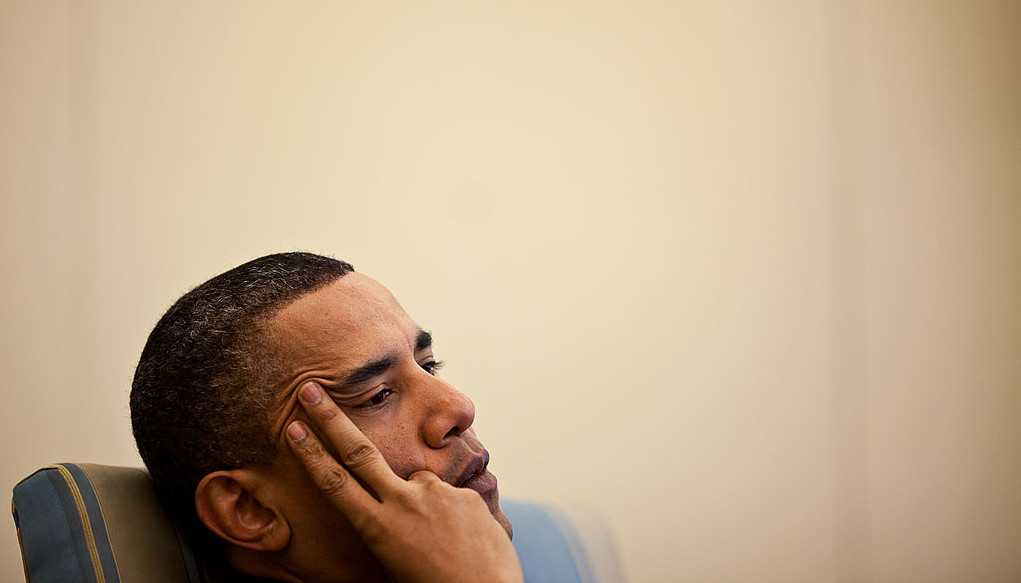Last week, President Obama signed the 2013 National Defense Authorization Act. Last year’s edition of the act contained language allowing for the indefinite detention of terrorists or their supporters. While that bill included provisions signaling out al-Qaeda and the Taliban, there was fear that this power could be used more broadly, and against American citizens. There was an effort to include language in the 2013 bill to make sure American citizens are not subject to indefinite detention, but this measure was not adopted.
Obama ran strongly against George W. Bush’s national security policy in the 2008 election, but has since adopted that same policy. Guantanamo Bay prison is still open, drones have become the favored tool for killing our enemies (even if those enemies are American citizens), American troops remain stuck in Iraq and Afghanistan, and the War on Terror is still going strong.
Why the reversal? Maybe Obama had access to enough scary intelligence that convinced him that these policies are vital to our security. Obama might have determined that scaling back the military-industrial complex energized by the War of Terror was not politically feasible early in his presidency. Or perhaps he wanted to show that Democrats aren’t the wimps Republicans accuse them of being.
In her recent book Drift, Rachel Maddow notes that the Founding Fathers were incredibly wary of standing armies, having seen firsthand how the British military was used to enforce the will of the king around the globe. They chose to make going to war difficult by mandating that Congress approve any declaration of war. For much of American history, the military has remained small, with massive demobilizations following the end of hostilities. For example, at the end of the Civil War the military stood at 1 million men; 12 years later, there were 27,000 men in the American military.
Obama, and Bush before him, is not the first president to consolidate power during times of war. In the movie Lincoln, Daniel-Day Lewis as Abraham Lincoln has a scene where he discusses using his war powers to enact the legally dubious Emancipation Proclamation. Also during the Civil War, Lincoln suspended the basic right of habeas corpus, and ignored court rulings that went against his action. In general, presidents are loath to give back powers they have gained.
The problem is that the War on Terror has no clear end, which means the consolidation of executive power and the militarization of American will only continue. Part of me approves of the idea of using drones in take out terrorists – seems more efficient than invading another country, right? And as an Obama supporter, I take some comfort in the fact that Obama is personally approving these done strikes. But would I have been as comfortable under President Romney? Who will be the first president to kill a terrorist with a drone on American soil? Will the public even care at that point, or will they be numb from decades of perpetual war?
In the movie, when someone asks what reins in his war powers, Lincoln answers “the people.” If America is ever going to dismantle the machinery of the War on Terror, it will take public pressure. There is a coalition that can be formed between libertarian-leaning Republicans and war-weary Democrats. But there needs to be a national political figure willing to take a stand on rolling back the American military-industrial complex. This complex is extremely entrenched, with federal military spending flowing into every state and lobbyists lined up to defend that spending.
It’s easy to make the case to a fearful America that every national security action taken is necessary for the public safety. But torture, indefinite detention, indiscriminate drone strikes, perpetual war, and a bloated defense budget are signs of weakness and fear, not strength. Strength arises from having the courage to uphold principles like the right to a trial, even if those principles are inconvenient. And while it’s naïve to suggest American return to the isolationist policies of the past, the last decade has swung us too far in the other direction, and made us too accustomed to war. President Obama has the chance to end the War on Terror, but so far he as remained unwillingly to show the necessary leadership.

Agree with everything. It's just sad that the people are not enough to rein in presidents, as elections are not supposed to be their only check. Thats the point of a constitutional republic (rather than a democracy) with checks and balances. However, the War on Terror has marked with a vehement denial of both of these principles, resulting in a steep rise of unconstitutional actions taken unilaterally by the executive (kind of exemplified in Obama's American-citizen-containing, non-judicially-nor-congressionally-approved 'Kill List' http://www.nytimes.com/2012/05/29/world/obamas-le….
With millions of people affected directly and indirectly by DoD contracts (http://reason.com/archives/2012/12/18/six-degrees-of-military-spending) the special interests are indeed extremely strong and difficult to be fought on an election by election basis.
Trusting our presidents (elected sometimes 4 years ago by just a plurality) to just pick the right people to torture and kill without trial is not acceptable. That's why we have to congressionally remove these powers from their office, do the painfully anti-special-interests thing of decreasing defense spending, and return to a policy of defense without offense to our freedoms. Or basic human rights and dignity.